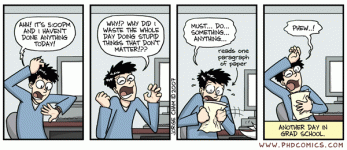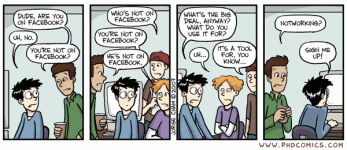In this 4-minute video, the author of Predictably Irrational discusses how each semester often ends painfully due to procrastination, which is fueled by a "heightened sensitivity to the short term" (a.k.a. hyperbolic discounting of distant rewards):
To help his students prevent procrastination, he allows them to pick their own deadlines (with negative consequences if they don't meet them), as discussed in his research article:
Procrastination is a learned behavior -- GazetteXtra
http://forum.psychlinks.ca/psychology-psychiatry-and-mental-health/9409-why-we-procrastinate.html
http://forum.psychlinks.ca/psycholo...-health/15460-overcoming-procrastination.html
If you procrastinate, don't put off reading this
http://forum.psychlinks.ca/psycholo...al-health/13908-are-you-a-procrastinator.html
http://forum.psychlinks.ca/psychology-psychiatry-and-mental-health/9410-the-lure-of-laziness.html
http://forum.psychlinks.ca/mental-h...ner-for-college-and-or-distance-learning.html
Related blog:
Don't Delay - Psychology Today
http://forum.psychlinks.ca/mental-h...ner-for-college-and-or-distance-learning.html
To help his students prevent procrastination, he allows them to pick their own deadlines (with negative consequences if they don't meet them), as discussed in his research article:
Related articles:This paper poses three questions: (1) Are people willing to self-impose meaningful (i.e., costly) deadlines to overcome procrastination? (2) Are self-imposed deadlines effective in improving task performance? (3) When self-imposing deadlines, do people set them optimally, for maximum performance enhancement? A set of studies examined these questions experimentally, showing that the answer is "yes" to the first two questions, and "no" to the third. People have self-control problems, they recognize them, and they try to control them by self-imposing costly deadlines. These deadlines help people control procrastination, but they are not as effective as some externally imposed deadlines in improving task performance.
Procrastination is a learned behavior -- GazetteXtra
http://forum.psychlinks.ca/psychology-psychiatry-and-mental-health/9409-why-we-procrastinate.html
http://forum.psychlinks.ca/psycholo...-health/15460-overcoming-procrastination.html
If you procrastinate, don't put off reading this
http://forum.psychlinks.ca/psycholo...al-health/13908-are-you-a-procrastinator.html
http://forum.psychlinks.ca/psychology-psychiatry-and-mental-health/9410-the-lure-of-laziness.html
http://forum.psychlinks.ca/mental-h...ner-for-college-and-or-distance-learning.html
Related blog:
Don't Delay - Psychology Today
http://forum.psychlinks.ca/mental-h...ner-for-college-and-or-distance-learning.html



